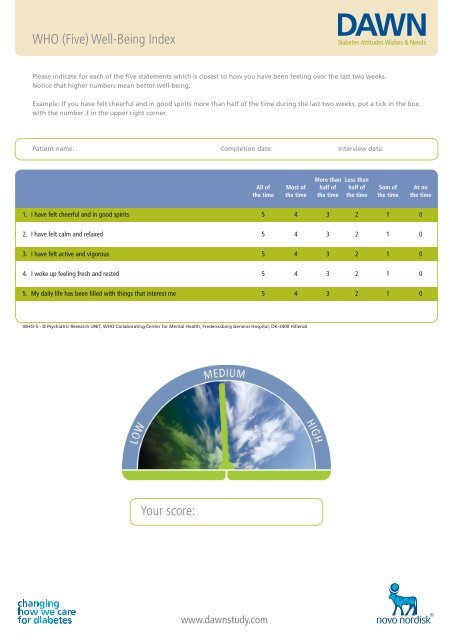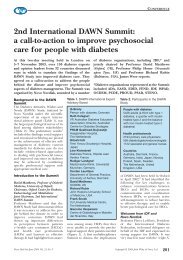WHO (Five) Well-Being Index Your score: - DAWN
WHO (Five) Well-Being Index Your score: - DAWN
WHO (Five) Well-Being Index Your score: - DAWN
Create successful ePaper yourself
Turn your PDF publications into a flip-book with our unique Google optimized e-Paper software.
<strong>WHO</strong> (<strong>Five</strong>) <strong>Well</strong>-<strong>Being</strong> <strong>Index</strong><br />
Please indicate for each of the fi ve statements which is closest to how you have been feeling over the last two weeks.<br />
Notice that higher numbers mean better well-being.<br />
Example: If you have felt cheerful and in good spirits more than half of the time during the last two weeks, put a tick in the box<br />
with the number 3 in the upper right corner.<br />
Patient name: Completion date:<br />
More than Less than<br />
All of Most of half of half of Som of At no<br />
the time the time the time the time the time the time<br />
1. I have felt cheerful and in good spirits 5 4 3 2 1 0<br />
2. I have felt calm and relaxed 5 4 3 2 1 0<br />
3. I have felt active and vigorous 5 4 3 2 1 0<br />
4. I woke up feeling fresh and rested 5 4 3 2 1 0<br />
5. My daily life has been fi lled with things that interest me 5 4 3 2 1 0<br />
<strong>WHO</strong>-5 - © Psychiatric Research UNIT, <strong>WHO</strong> Collaborating Center for Mental Health, Frederiksborg General Hospital, DK-3400 Hillerød<br />
<strong>Your</strong> <strong>score</strong>:<br />
www.dawnstudy.com<br />
Interview date:
<strong>WHO</strong>-5 <strong>Well</strong>-being <strong>Index</strong><br />
Why measure emotional well-being?<br />
Subjective well-being is an important dimension of overall perceived quality of life and in its own right<br />
an important outcome of diabetes care. In people with diabetes emotional well-being may be compromised<br />
by the burden of living with diabetes and/or life stresses. Depression is common among persons<br />
with diabetes, affecting 10-20% of the patient population. Unfortunately the diagnosis of depression is<br />
often missed by health care professionals. Using a short questionnaire as the <strong>WHO</strong>-5 can help to monitor<br />
emotional well-being in patients as part of clinical routine and enhance the likelihood of recognizing<br />
depression. International clinical guidelines recommend to systematically monitor emotional well-being<br />
in patients with diabetes.<br />
Why the <strong>WHO</strong>-5?<br />
The <strong>WHO</strong>-5 <strong>Well</strong>-being <strong>Index</strong> is a short, self-administered questionnaire covering 5 positively worded<br />
items, related to positive mood (good spirits, relaxation), vitality (being active and waking up fresh and<br />
rested), and general interests (being interested in things). It has shown to be a reliable measure of emotional<br />
functioning and a good screener for depression. Administering the <strong>WHO</strong>-5 <strong>Well</strong>-being <strong>Index</strong> takes<br />
2-3 minutes and can be integrated in clinical routine, both in primary and secondary care.<br />
The measure is freely available in many languages (www.who-5.org)<br />
How to use the <strong>WHO</strong>-5?<br />
It is advised to incorporate the <strong>WHO</strong>-5 in the annual review, as a measure of emotional well-being, in<br />
combination with a diabetes-specifi c measure of distress, e.g. the PAID (Problem Areas In Diabetes) scale.<br />
In addition, the <strong>WHO</strong>-5 can be applied ad hoc in situations where there is a need for additional information<br />
on the patients’ mood.<br />
Each of the fi ve items is rated on a 6-point Likert scale from 0 (= not present) to 5 (= constantly present).<br />
Scores are summated, with raw <strong>score</strong> ranging from 0 to 25. Then the <strong>score</strong>s are transformed to 0-100 by<br />
multiplying by 4, with higher <strong>score</strong>s meaning better well-being.<br />
Evidence suggests, a <strong>score</strong> of 50 or below is indicative for low mood, though not necessarily depression.<br />
A <strong>score</strong> of 28 or below indicates likely depression and warrants further assessment (diagnostic interview)<br />
to confi rm depression.<br />
In order to monitor possible changes in well-being, a 10% difference can be regarded as a signifi cant<br />
change.<br />
Feeding back <strong>WHO</strong>-5 outcome<br />
Feeding back the <strong>WHO</strong>-<strong>score</strong> to patients can help to validate the importance of well-being in the process<br />
of diabetes self-management and address psychological issues.<br />
The aim of discussing the <strong>score</strong> is not diagnose, but to feed back and discuss the information in constructive,<br />
non-judgemental manner. The patient is invited to comment on the fi nding and refl ect on the need<br />
of help.<br />
Frank Snoek, March 3, 2006 for <strong>DAWN</strong>/Novo Nordisk




